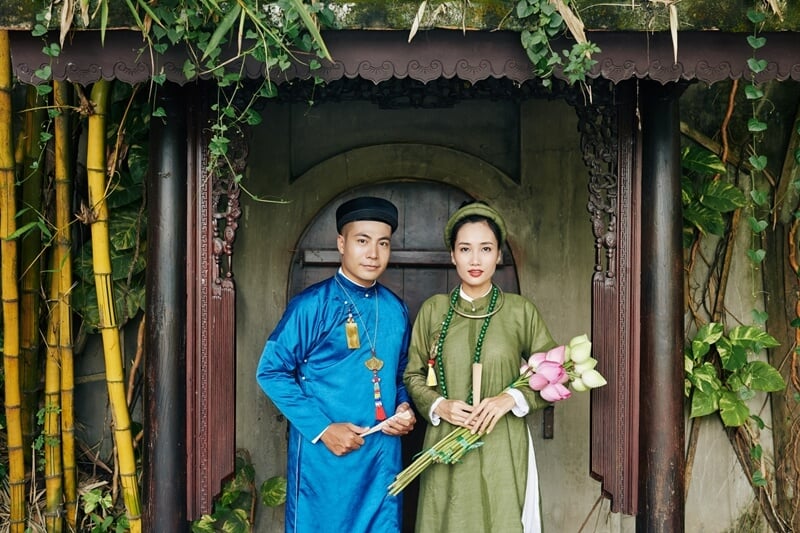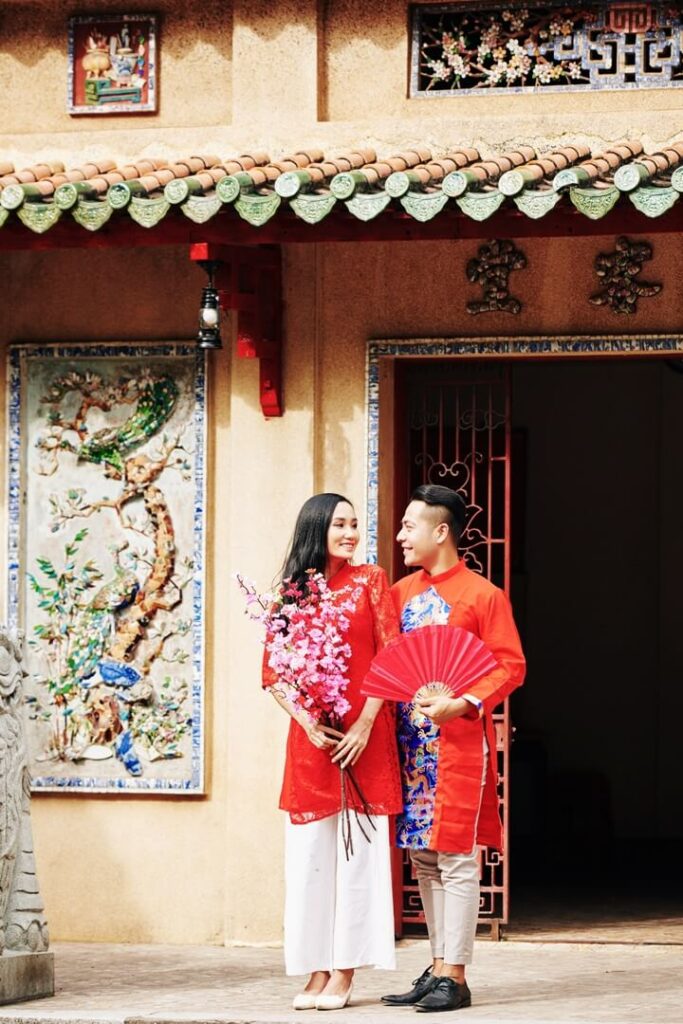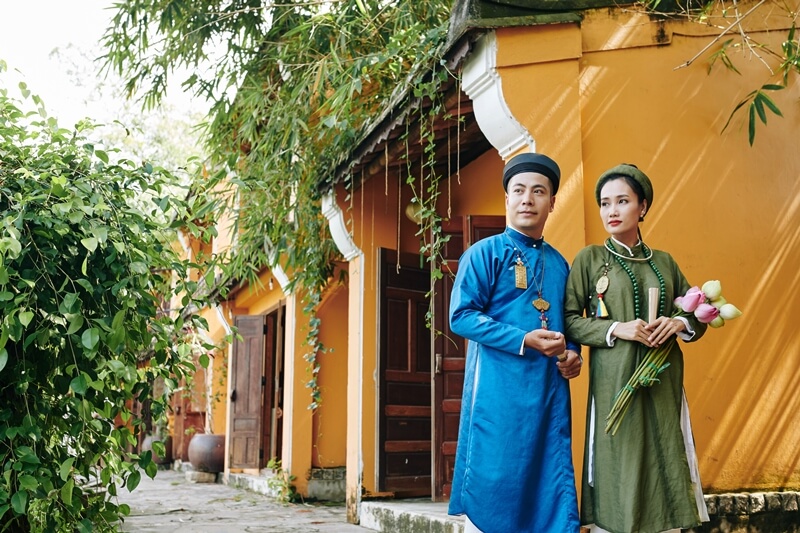In this post, you will find the critical features of Vietnamese families, including:
- The husband and wife relationship
- Ranged marriage changed
- Equality between men and women
- Various values related to children
- Smaller family sizes in modern life
Let’s go!
1. Change in the age to get marriage
Despite the increasing trend and risk of divorce, marriage has always played an essential role in Vietnam.
Therefore, reaching adulthood to establish a family is a principle in everyone’s mind. According to regulations, the age of the majority in Vietnam is 18 years old for both men and women, which is the age allowed to get married. However, for those who choose to follow the educational path, the least to get married is after finishing university.
You will see that the marriage age of Vietnamese people is relatively early, only 26 years old. Young people living in rural areas get married earlier than those in urban areas, girls get married earlier than boys, and people who graduate college marry later than those who do not.
The age at which people get married in Vietnam tends to increase, which proves that individualism develops over time.
Despite that, everyone believes that marriage is a vital factor in forming a family and maintaining the sustainability of the Vietnamese family. So most people consider getting married one of life’s most important things.
>> You may like to read Vietnam Women’s Day.
2. Changes in the way of choosing a life partner in Vietnamese families
In the past, arranged marriage was a mandatory element in most Vietnamese families based on family features, same class, social suitability, and status.
Arranged marriage began to change in 1959 when the Law on Marriage and Family was introduced. The law officially abolished arranged marriage and polygamy and established a new value of marriage: love-based marriage and monogamy. However, the concept of arranged marriage still existed in many Vietnamese families until the early 1990s, when there was complete openness.
Since then, boys and girls have been more accessible in their understanding of lifestyle and more comfortable in their perception of love and relationships. Criteria for choosing a husband or wife are more personal, such as based on love, education, health, profession, personality, and appearance. Economic factors play a weaker role in the above criteria.
According to the old way of thinking of the community, the elements of marriage suitable for the conditions of two families, husband, and wife in the same locality and ethnicity, are no longer as important as before. This shows that the choice of spouse is shifting from the old perspective to a more modern consciousness in Vietnamese families and social life.
3. Equality between men and women in Vietnamese families
Due to the influence of agriculture, the demand for manual labor was high in the past, so the concept of respecting men was high, besides the son working and taking over the family later. This concept has existed for a long time in Vietnamese family life.
Today, that concept has changed a lot; men and women have equal rights in the family and society. It is natural for husband and wife to work together and contribute economically to the family.
However, in the subconscious of many Vietnamese people, husbands must be the economic breadwinners for the family, the ones who lead the family. That invisibly creates a financial burden on the husband’s shoulders and, at the same time, puts the woman in the role of a housewife.
In many Vietnamese villages, the number of families supporting both husband and wife working has increased. However, they still emphasize the woman’s role in caring for the family, especially when the family has small children. Meanwhile, social services to support the family are limited, and the pressure on women is more significant.
In short, the problems of imbalance and patriarchy are mainly in the countryside, where there is little access to innovation and modern techniques.
4. Various values related to children
Children have always played an essential role in family and marriage. Contrary to the old belief, most people do not like to have many children, especially in big cities in Vietnam like Hanoi and Saigon.
Many couples see children as a bond, a foundation for striving, and a spiritual value that maintains the stability of the marital relationship, and most do not accept a marriage without children.
Many Vietnamese families’ thoughts about the value of children have also changed over time. The desire to have a son to care for parents and grandparents in old age and to have a prominent worker in the family gradually turns to psychological and emotional values, such as improving marriage relationships, self-improvement, and someone to love.
The concept that children’s maturity is measured by economic value, which means the monetary amount that an adult child can make, is still in the minds of many traditional families, families with little access to modern life, families with low economic conditions, in underdeveloped areas such as the Mekong Delta and the Central Highlands.
The upbringing of children is considered today to be the joint work of husband and wife. In the past, when the family had many generations living together, grandparents also contributed significantly in helping to educate children, especially moral teaching.
However, many Vietnamese women view raising and educating their children as their primary responsibility. This view unintentionally creates a burden and pressure for the wife and the mother in the family.
5. Smaller family sizes
Before 2000, it was easy to find many families with various generations living together, including grandparents, parents, and children. There are many houses where couples live together.
However, with the change in personalization, the desire for a private life increases. Multigenerational families are gradually becoming hard to find; nuclear families replace traditional ones.
Reserving grandparents remains a cornerstone of Vietnamese culture despite the shift towards nuclear families. This is evident in the tradition of young families visiting their elders on official holidays, showing the values of respect and family roots in the younger generation.
A reverse development has formed in the family structure in Vietnam. Multigenerational families in rural areas are gradually shrinking, while in urban areas, there is an increasing trend in this regard. The main problem may lie in the price of houses and land in big cities, which is too expensive for many young families.
Even so, the desire to live separately in a nuclear family still dominates the thinking of many Vietnamese. When they are economically eligible, young families are ready to leave the crowded house to develop their small one. Since then, the conditions for taking care of grandparents and elderly parents have gradually decreased.
However, raising grandparents and elderly parents is still the responsibility of the children. They don’t like sending their parents to nursing homes, which makes them more burdened in life, but it is a responsibility that many people still keep to fulfill their duties and morals.
Indeed, there are many things you can’t see right away just by looking at or hearing something on TV or through narrative.
Although I have detailed the outstanding aspects above, it is when you have lived with a family in Vietnam that you have a better understanding of the way of life of the people there.








